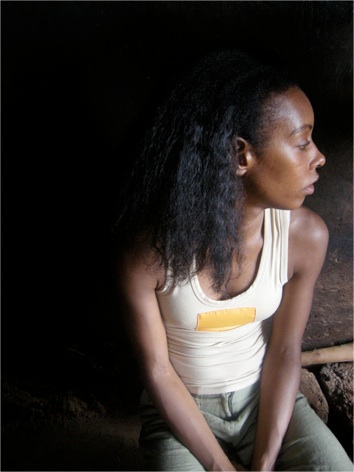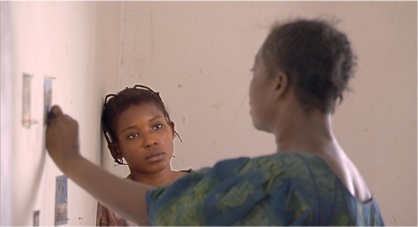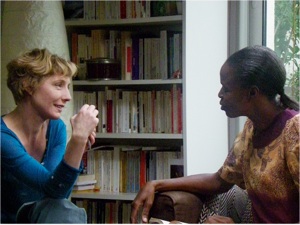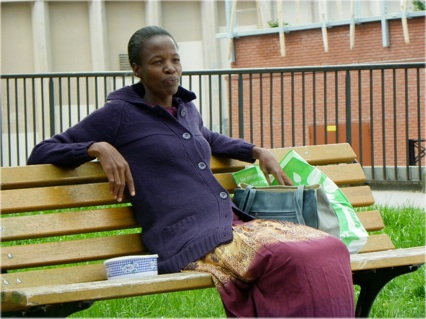Bio /
Sarah Bouyain’s first feature-length film is full of the dark weight of sorrow and the glimmer of buried feelings. It timidly opens the door onto the fractures that mark women. The destinies of three women collide : the solitary Mariam, from Africa, who has retreated into her work cleaning the offices of a Parisian bank ; the young mixed-race Amy who takes off in search of her African mother;
and Acita, Amy’s aunt who lives in Burkina and who knows the past others would like to forget. But Amy, who decides to go to Burkina, does not speak Dioula and so can only communicate with Acita through Kadiatou, her maid.
Mariam’s life in the suburbs wears on her, the only glimmer in its dreariness are the Dioula classes she gives to Esther, a French woman employed at the bank where she cleans.
Amy runs up against indifference, the night, the language she does not speak. Acita wants to regain Amy as the daughter she never had. Amy persists in the search for her mother who seems to have vanished. Distance causes separation, continents become frontiers, time deepens the pain. Amy tries to reconcile the images of her father, a white man who settled in France and who died a year ago, with the obscure outline of her African mother whom she knew only as a child. Between abrupt associations and moments of imaginative candor, the various relations gradually become clearer.

Assita Ouédraogo par F.Vayssières
Dorylia Calmel par R. Bellec
The dissociated, vague identities Amy tries to redraw, the better to accept them, vibrate in The place in between without clashing. Generations confront each other, cultures collide, lives march by. Amy wants to take her life in hand by acknowledging her origins.
Mariam lets her life slip away across the repetition of the days as she pines the child taken from her.
The editing accentuates these fractures; the frames fix the movement. There is an “on-the-edge” intensity in the ac- tors’ performances. Dorylia Calmel, merciless in The Bloodiest by Jean-Piere Bekolo, presses on as an unsettled young mixed-race woman. Assita Ouaédraogo, combative in The Promise by the Dardenne brothers, internalizes the feeling of exile. Blandine Yaméogo, irrational in Delwende by Pierre Yameogo, gives nuance to the fractures.

Nathalie Richard and Djénéba Koné hold their places around these women in crisis, eclipsing the few men scattered throughout the story - and that because The place in between is above all a woman’s affair. Filmmaker Sarah Bouyain, born in France to a father of Burkinan origin, has explored her mixed-race roots in a documentary Children of the White Man, 2000 and a collection of short stories Métisse façon, 2003.

Shooting her film in both the Parisian suburbs and Bobo-Dioulasso, Sarah Bouyain harmoniously associates the various locations, which allows her to delicately explore the filiation that threads its way between the women, between the mixed colors while suggesting that when one’s heart is at peace one can open that heart to the world.
Michel Amarger, translated by Theresa Murphy
Nathalie Richard et Assita Ouédraogo par F.Vayssières
Nadine Kambou Yéri et Blandine Yaméogo, photo extraite du film








